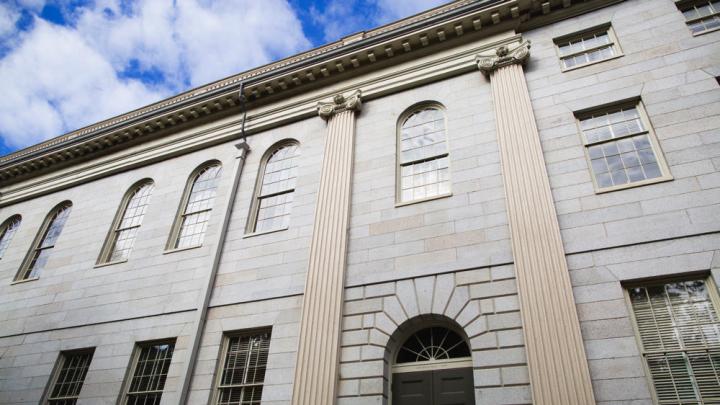An unusually large number of Faculty of Arts and Sciences (FAS) members crowded into Science Center B this afternoon—a larger venue than the Faculty Room in University Hall—expecting to hear the end of debate and to vote on a faculty-written motion intended to counteract the College's sanctions on members of unrecognized, single-sex social organizations: final clubs, sororities, fraternities. (Read an extensive background report, “Final Club Complications,” filed earlier today, here.) But as debate extended through the scheduled 5:30 p.m. time to adjourn, with more speakers waiting to be heard, the docket committee recommended that the debate be continued to the next meeting, scheduled in February, after the year-end holiday break, and so the meeting this afternoon concluded without reaching a vote.
Debate continued for more than an hour, in part because the docket committee moved for indefinite postponement of the underlying motion. That motion is a proposal introduced by Gordon McKay professor of computer science Harry R. Lewis, a former dean of the College, and colleagues reading, “Harvard College shall not discriminate against students on the basis of organizations they join, nor political parties with which they affiliate, nor social, political, or other affinity groups they join, as long as those organizations, parties, or groups have not been judged to be illegal.”
It was drafted in response to sanctions advanced by the current dean, Rakesh Khurana, and President Drew Faust, last May, under which future undergraduates who join one of the unrecognized, single-gender social organizations would be precluded from holding leadership positions in recognized organizations (sports teams, choruses, and so on), or from receiving the required College endorsement in support of their applications for fellowships (Rhodes and Marshall scholarships, for instance).
Indefinite postponement can have the effect of removing an issue from further substantive discussion, without reaching a vote on its merits; the docket committee apparently aimed for that outcome, reflecting the inability of the Faculty Council (elected members who work closely with the FAS dean and University administrators, and vet legislation for the larger FAS membership) to come to a conclusion and vote on the motion advanced by Lewis and his colleagues.
Lewis introduced the motion and restated the case for it. The faculty members who chair the committee Khurana chartered to implement the sanctions then attempted to give a progress report, but were ruled out of order because the motion for indefinite postponement had already been made; it takes precedence. In subsequent debate, Faust toggled between critics and proponents of the motion. The arguments touched on the opposing notions of principle (the issues of students’ right of association that Lewis has emphasized); efficacy (whether the sanctions would help address sexual assault or other problems); discrimination (the gendered admissions policies of the final clubs, and particularly the long-established, well-endowed male final clubs that own club buildings in Harvard Square); and governance (criticisms of the processes by which the sanctions were developed and promulgated, and the chartering of the implementation committee, neither of which came before the full faculty for discussion or action).
A full report on the debate, with summaries of the presentations and speakers’ texts, where available, will be filed in coming days. (Under FAS rules, speakers must grant permission to be associated by name with direct quotes from or paraphrases of their remarks from the floor.) Please check back for updates.








